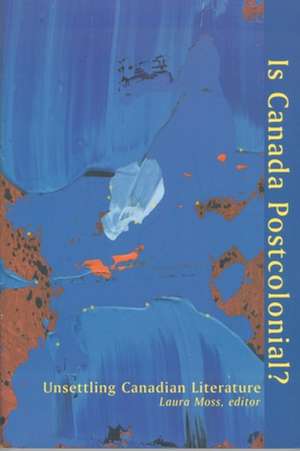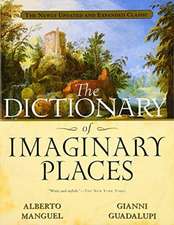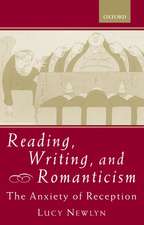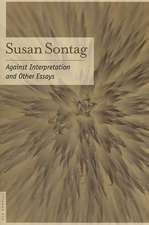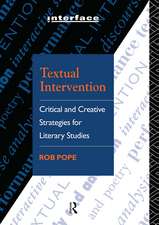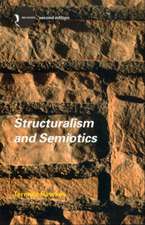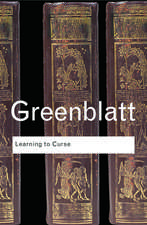Is Canada Postcolonial?
Editat de Laura Mossen Limba Engleză Paperback – 30 apr 2003
Preț: 327.77 lei
Nou
62.73€ • 64.80$ • 52.20£
Carte tipărită la comandă
Livrare economică 25 martie-08 aprilie
Specificații
ISBN-10: 0889204160
Pagini: 328
Ilustrații: Illustrations, port.
Dimensiuni: 150 x 226 x 20 mm
Greutate: 0.5 kg
Editura: Wilfrid Laurier University Press
Cuprins
Table of Contents for
Is Canada Postcolonial? Unsettling Canadian Literature, edited by Laura Moss
Preface: Is Canada Postcolonical? Introducing the Question | Laura Moss
Part 1: Questioning Canadian Postcolonialism
What Was Canada? | George Elliott Clark
What Resides in the Question, "Is Canada Postcolonial?" | Neil Besner
Canada and Postcolonialism: Question, Inventories, and Futures | Diana Brydon
Looking Elsewhere for Answers to the Postcolonial Question: From Literary Studies to State Policy in Canada | Donna Palmateer Pennee
Part 2: Postcolonical Methodologies
The Absence of Seaming, Or How I Almost Despair of Dancing: How Postcolonical Are Canada's Literary Institutions and Critical Practices? | Susan Gingell
Native Writing, Academic Theory: Postcolonialism across the Cultural Divide | Judith Leggatt
Nostalgic Narratives and the Otherness Industry | Mridula Nath Chakraborty
Cool Dots and a Hybrid Scarborough: Multiculturalism as Canadian Myth | Chelva Kanaganayakam
Part 3: Is Canadian Literature Postcolonial?
Imagining Eighteenth-Century Quebec: British Literature and Colonical Rhetoric | Pam Perkins
"I too am a Canadian": John Richardson's The Canadian Brothers as Postcolonical Narrative | Douglas Ivison
Are We There Yet? Reading the "Post-Colonial" and The Imperialist in Canada | Cecily Devereus
Figures of Collection and (Post)Colonical Processes in Major John Richardson's Wacousta and Thomas King's Truth and Bright Water | Barbara S. Bruce
Stolen Life? Reading through Two I's in Postcolonical Collaborative Autobiography | Manina Jones
"A Place to Stand On": (Post)colonical Identity in The Diviners and "The Rain Child" | Karen E. Macfarlane
A "Place" Through Language: Postcolonical Implications of Mennonite/s Writing in Western Canada | Amy Kroeker
What's Immigration Got to Do with It? Postcolonialism and Shifting Notions of Exile in Nino Ricci's Italian-Canadians | Jim Zucchero
Religion, Postcolonical Side-by-sidedness, and la transculture | Marie Vautier
After Postcolonialism: Migrant Lines and the Politics of From in Fred Wah, M. Nourbese Philip, and Roy Miki | Robert Budde
Part 4: Meditations on the Question
Is Canada a Postcolonial Country? | Len Findlay
Answering the Questions | Terry Goldie
Answering the Answers, Asking More Questions | Victor J. Ramrag
Afterword | Stephen Slemon
Bibliography
Notes on Contributors
Index
Notes on Contributors
Neil Besner, Dean of Humanities at The University of Winnipeg, has taught Canadian literature there since 1987. His publications include books on Mavis Gallant (1988) and Alice Munro (1991), and co-edited collections of short fiction and poetry. His most recent work includes a co-edited special issue, with Sergio Bellei, of the Brazilian journal Desterros (2003) exploring Brazilian/Canadian versions and visions of postcolonial theory across the two cultures. His translation of the Brazilian biography of Elizabeth Bishop and Lota de Macedo Soares, Rare and Commonplace Flowers, appeared in 2002, and his edited collection of essays, Carol Shields: The Arts of a Writing Life is forthcoming in 2003.
Barbara S. Bruce is a PhD candidate at The University of Western Ontario. Her doctoral thesis, for which she has received SSHRC doctoral support, examines representations of museums and collecting in Canadian literature. Currently working as adjunct faculty at UWO, she is teaching courses on reading culture through literary and filmic representations of cuisine and horror.
Diana Brydon, Robert and Ruth Lumsden Professor of English, teaches Canadian and postcolonial literatures at The University of Western Ontario. The author of books on Timothy Findley and postcolonial literature, she has edited Postcolonialism: Critical Concepts in Literary and Cultural Studies (2000) and co-edited Shakespeare in Canada: A World Elsewhere? (2002). She is currently working on globalization, autonomy, and postcolonial studies with funding support from SSHRC.
Robert Budde teaches creative writing and critical theory at The University of Northern British Columbia. He has published two books of poetry, Catch as Catch and traffick, and two novels, Misshapen and, most recently, The Dying Poem. He has a collection of short prose, flicker, and interviews In Muddy Water: Conversations with 11 Poets, forthcoming in 2003.
Mridula Nath Chakraborty completed her M.Phil in English from the Faculty of Arts, University of Delhi, in 1995. She subsequently taught English literature at various colleges affiliated to The University of Delhi. She is currently pursuing her PhD in English at The University of Alberta. Her dissertation explores the tensions between postcolonial identity politics in the academy and third-world feminisms of colour in white-settler colonies. She has also translated and co-edited, with Dr Rani Ray, A Treasury of Bangla Stories (1999). She is now translating a collection of short stories by modern Hindi writers.
George Elliot Clarke is a self-proclaimed "Africadian" (African-Nova Scotian), with maternal roots in Nova Scotia dating back to 1813. Clarke taught at Duke University, 1994-99, and is now an associate professor of English at The University of Toronto. A pioneering authority on African-Canadian literature, Clarke's latest critical book is Odysseys Home: Mapping African-Canadian Literature (2002). Also a noted poet, playwright, and librettist, Clarke received the 2001 Governor-General's Literary Award for Poetry for his book, Execution Poems.
Cecily Devereux is an associate professor in the Department of English at The University of Alberta. Recent work on gender, race, and empire-with particular reference to white slavery and to the politics of imperial motherhood have appeared in the Victorian Review, Canadian Children's Literature, Essays on Canadian Writing, and Women's Studies International Forum. A scholarly edition of L.M. Montgomery's Anne of Green Gables is forthcoming (2003).
Len Findlay is Professor of English and Director of the Humanities Research Unit at The University of Saskatchewan. Widely published in nineteenth-century studies, literary theory, and the nature and role of universities and the humanities in Canada, his most recent work includes a co-edited collection, Pursuing Academic Freedom: 'Free and Fearless'? (2001). He is currently collaborating on a SSHRC-sponsored endeavour entitled "Decolonizing Education: An Interdisciplinary Aboriginal Research Project."
Susan Gingell teaches and researches Canadian and other decolonizing Anglophone literatures at The University of Saskatchewan. Her work is informed by feminist, anti-racist, and anti-homophobic politics. Past publications include E.J. Pratt, On His Life and Poetry and Pursuits Amateur and Academic: The Selected Prose of E.J. Pratt, as well as an edition of stories from Saskatoon, The Bridge City Anthology, and essays on a wide-range of authors and subjects. Her current research project is on textualizing orature and orality in Canadian/Turtle Island and Afro- Caribbean contexts.
Terry Goldie teaches at York University. He is the author of Fear and Temptation: The Image of the Indigene in Canadian, Australian and New Zealand Literatures (1989) and Pink Snow: Homotextual Possibilities in Canadian Fiction (2003); editor of In a Queer Country: Gay and Lesbian Studies in a Canadian Context (2001) and co-editor (with Daniel David Moses) of Canadian Native Literature in English (1998). He is at present working on a book tentatively titled Lifewright: A Theoretical Sexual Autobiography.
Douglas Ivison teaches Canadian literature at Memorial University of Newfoundland. He is the editor of The Dictionary of Literary Biography 251: Canadian Fantasy and Science-Fiction Writers (2002), and has published a number of articles on nineteenth and twentieth century Canadian, American, and British literatures. He's currently completing a book on adventure literature and spatial theory, and is also pursuing research on the representation of the urban in Canadian literature.
Manina Jones is an associate professor in the Department of English at The University of Western Ontario, where she teaches courses on Canadian literature, critical theory and detective fiction. She is coauthor, with Priscilla L. Walton, of Detective Agency: Women Re-Writing the Hard-Boiled Tradition (1999), and author of That Art of Difference: Documentary-Collage and English Canadian Writing (1993), as well as articles on Canadian poetry, fiction, and drama.
Chelva Kanaganayakam is currently Professor of English at The University of Toronto. His publications include, Structures of Negation: The Writings of Zulfikar Ghose (1993), Configurations of Exile: South Asian Writers and Their World (1995), Dark Antonyms and Paradise: The Poetry of Rienzi Crusz (1997), and Counterrealism and Indo-Anglian Fiction (2002).
Amy Kroker recently completed a Master of Arts degree on Western Canadian Mennonite literature and postcolonial theory at The University of Manitoba and is currently working for the Mennonite Central Committee in Winnipeg, Manitoba.
Judith Leggatt teaches Post-Colonial, First Nations, Canadian, and Women's literatures at Lakehead University. She has published articles on Lee Maracle, Salman Rushdie, and Post-Colonial pedagogy. Her present research interests include the representations of dirt and disease in First Nations literature, and the intersections of science fiction and Post-Colonialism.
Karen MacFarlane teaches Canadian literature and postcolonial literatures at Mount St. Vincent University. She has published articles on Lee Maracle, Margaret Atwood, and Daphne Marlatt, among others. She is currently working on contemporary Canadian women writers, feminist theory, and metafictional strategies and on a monograph on Margaret Atwood's life and works.
Laura Moss is an assistant professor at The University of British Columbia. She was a member of the Department of English at The University of Manitoba from 1998-2002. She teaches Canadian and African literatures and postcolonial theory. Her publications include articles on a range of authors from Chinua Achebe to Zoë Wicomb and on topics ranging from realism to resistance. Moss is the editor of a scholarly edition of Frances Brooke's The History of Emily Montague in the Canadian Critical Editions Series (2001). Her current project, tentatively titled Everyday Hybridity in Canadian Literature: 1971-2001, examines both the "mainstreaming of multiculturalism" in Canadian literature and responses to the Canadian Multiculturalism Policy of 1971.
Donna Palmateer Pennee is Associate Professor in the English program and Associate Dean of Arts and Social Sciences at The University of Guelph. An award-winning teacher, her research on cultural nationalisms and globalization has been publicized through international and national conferences; articles and reviews have appeared in such journals as Essays on Canadian Writing, Studies in Canadian Literature/Études en literature canadienne, Canadian Literature, and International Journal of Canadian Studies/Revue internationale d'études canadiennes. Early monographs on Timothy Findley (Praying for Rain: Timothy Findley's Not Wanted on the Voyage, 1993; Moral Metafiction: Counter-discourse in the Novels of Timothy Findley, 1991) were published by ECW Press. She is also a contributing co-editor of the essay collection New Contexts of Canadian Criticism (1997), and a contributor to Adele Wiseman: Essays on her Works (2001).
Pam Perkins teaches at The University of Manitoba and specializes in women's writing of the late eighteenth and early nineteenth centuries. Other research interests include eighteenth-century British exploration literature. She has published articles on a range of writers including Frances Brooke, Frances Burney, Jane Austen, and Mary Wollstonecraft. She is the editor of Robert Bage's Hermsprong or, Man as he is Not (2002) and co-editor (with Shannon Russell) of Elizabeth Hamilton's Translations of the Letters of a Hindoo Rajah (1999).
Victor J. Ramraj is Professor of English, University of Calgary, where he has been on faculty since 1970. He was editor of ARIEL: A Review of International English Literature (1990-2001) and President of CALJ (Canadian Association of Learned Journals). He is past President of CACLALS (Canadian Association for Commonwealth Literature and Language Studies). His publications include a book on Mordecai Richler and an anthology Concert of Voices: An Anthology of World Writing in English (1995). He is currently working on a study of the politics of differences and affinities in International English literature. His play The Dead Son earned him the Playwright-of the-Year Award, Georgetown, Guyana, 1966.
Stephen Slemon teaches postcolonial literatures and theory at The University of Alberta. He is currently working on two book projects: the first, an elaboration of the colonial stereotype of "thuggee" in British India, and afterwards; the second, an analysis of the literature of mountaineering.
Marie Vautier teaches Québécois literature, comparative Canadian literature, and contemporary literary theory at The University of Victoria. She is the author of New World Myth: Postmodernism and Postcolonialism in Canadian Fiction (1998), and has published widely on postmodernism, postcolonialism, feminism, and New World writing in Canada, the United States, and Europe. Aparallel article on "le postcolonialisme de consensus" in Québec is forthcoming in Québec Studies. She is presently working on a translation of a Québécois poetry anthology, as well as a book on postcolonial identities and New World spiritualities.
Jim Zucchero works as an academic counselor at King's College, The University of Western Ontario. He is completing his PhD in the Department of English at The University of Western Ontario. His dissertation examines relationships between ethnicity, multiculturalism in Canada, and Italian-Canadian literature as a record of one group's experience of ethnicity in Canadian society. His current research is on multiculturalism in Canada, personal and collective notions of identity, ethnicity, theories of hybridity, history, and memory.
